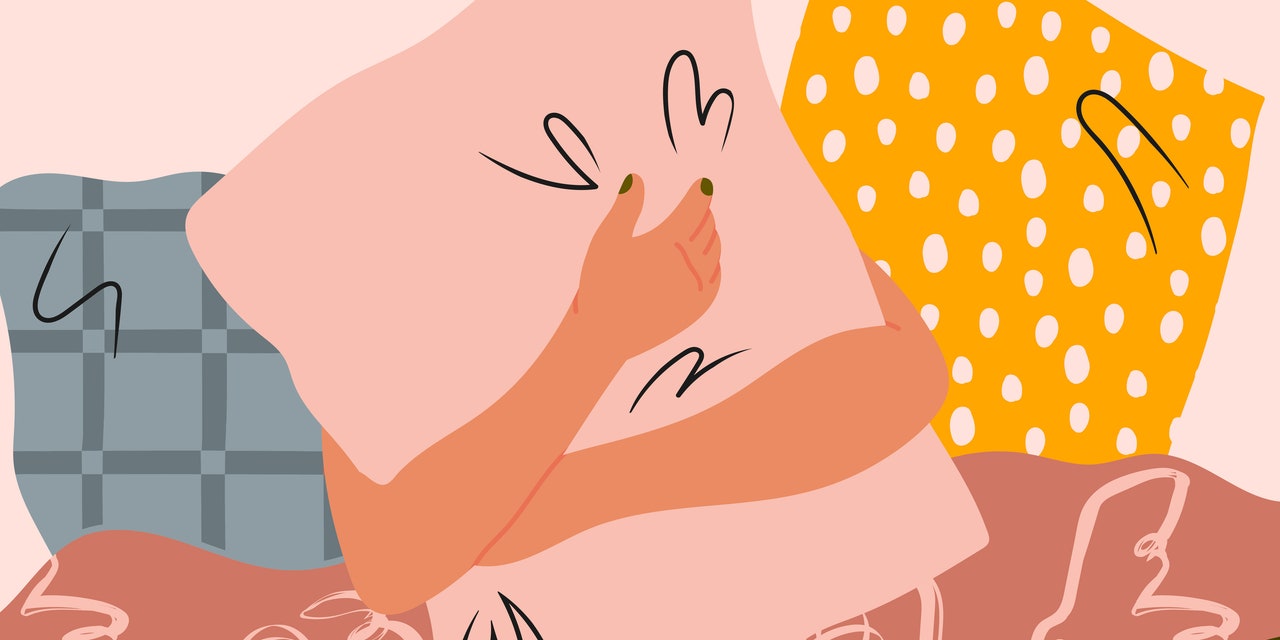As I sit down to write this article, I can’t help but think that the timing is uncanny. I have a super mild cold right now—so mild that, to the casual observer, I probably seem completely healthy. But I must’ve picked up some germ, because I have the classic cold symptoms: My eyes are glassy, my throat is scratchy, I’m a bit sneezy, and my energy’s low. It’s no big deal overall—I’m still able to walk my dog and work from home as usual. It becomes an issue around 10 p.m. though, when I crawl into bed ready for a restful sleep, only to start coughing and sniffling more than I did all day.
About a week ago, I spoke with Dan Pastula, MD, chief of neuroinfectious diseases and global neurology at the University of Colorado School of Medicine and Colorado School of Public Health, for this very assignment about why upper respiratory infection symptoms like a cough, sore throat, and runny nose, tend to ramp up while you’re trying to sleep. Dr. Pastula walked me through all the factors that join forces to make colds feel so much worse at night.
So a few days later, when my own cold set in and I was desperate for a restful sleep but couldn’t stop coughing, I knew exactly what was going on. (Like I said, uncanny timing!) Here’s why your cold becomes such a nightmare after dark.
Why do cold symptoms get worse at night?
Your body fights the virus harder at bedtime.
Many pathogens can cause the common cold: adenoviruses, coronaviruses (yes, beyond the kind that causes COVID-19), and most commonly, rhinoviruses—to name a few.1 Respiratory syncytial virus (RSV) and even mild flu and COVID infections can also feel quite cold-like. When you get infected with one of these viruses, your body mounts an immune response to fight and kill the bug, which creates inflammation throughout your body and makes you feel crummy, Eric Ascher, DO, a family medicine physician at Northwell Lenox Hill Hospital in New York City, tells SELF.2
The ebb and flow of your symptoms and how they appear during the day versus at night is largely influenced by your circadian rhythm, which is a mix of physiological, mental, and behavioral changes that operate around a 24-hour cycle.3 (Hence why it’s commonly referred to as the body’s internal clock.) In the daytime, your energy goes toward tasks like working, taking care of your family, exercising, or grocery shopping; but at night, when your to-do list is behind you, your body is able to direct way more energy toward powering up your immune system, Dr. Ascher says.4
To get more specific, cortisol (your body’s main stress hormone) tends to increase in the daytime.5 Higher levels of cortisol are known to quiet your immune system, says Dr. Pastula.6 So when cortisol drops off at night, the immune system revs up; and as a result, so does inflammation, he explains.7 2 “While this is a normal and necessary process to heal, it also causes your common cold symptoms to feel worse,” Dr. Ascher says.
READ RELATED: Television star Shelly Horton says entering menopause ‘destroyed her work ethic’
The fact that you’re lying down also doesn’t help.
Another reason you might cough more and feel extra congested at night: You’re literally horizontal. When you’re sitting upright or walking around, gravity’s at play, pulling your snot down and out of your clogged-up face—which is why you may need a box of tissues within arm’s reach at all times.8 9 When you lie flat in bed, though, all of that mucus can collect in your head and exacerbate a cough, stuffy nose, or post-nasal drip (when snot accumulates in the back of your throat). “People will feel worse at night because you’re removing the effect of gravity that was helping you throughout the day,” says Dr. Pastula.
When the lights go out, it’s just you and your cold.
Finally, there are a ton of distractions during the day. You’re likely thinking less about your cold and more about that work project you need to finish by 3 p.m. or when you have to pick your kid up from school, perhaps. Even if you’re taking a sick day, you’re probably reading a comforting novel, watching Netflix, or maybe scrolling for funny memes or reels on Instagram. “But when you lie down to go to bed at night, it’s just you and your symptoms,” Dr. Pastula says. When there’s not much else going on, your watering eyes and intense head pressure become more noticeable—and unbearable.
How to make cold symptoms more tolerable at night
Prioritize hydration—in your body and in the air.
Before you go to bed, sip some water. You become less hydrated overnight, since you’re (hopefully) sleeping and therefore not taking in liquids. If you’re worried about waking up to pee a trillion times (very real!), try to drink enough water throughout the day and just have a few sips before you turn in. Being dehydrated will thicken up your mucus and clog your sinuses, Dr. Pastula explains, so staying hydrated will loosen things up and make it easier to cough up and clear out the snot.10





